
Jesus frequently calls on His listeners to repent - to stop what they're doing, to undergo a change of heart, and to choose to do things that are better. But He also frequently exhorts His listeners to "Be Not Afraid", because He's there to help us follow Him: "My yoke is easy, and my burden is light."
That yoke doesn't feel so light if one is struggling with sins of addiction, or challenged by discrepancies between the traditional social mores expressed in the Bible and the truth of personal lived experience, or if one grows up in an environment that twists traditional Christianity into profound repression.
I have a close friend who struggled for years with post-traumatic stress disorder brought on by the stories told in his extreme Christian community - that salvation depended on a transformative "come to Jesus" moment which he had not yet had, and the Rapture was likely to happen at any moment.
Every time he came home from school and his parents were out at the store, he wondered whether the Rapture had happened and he'd been left behind. Well, the Rapture didn't happen, and isn't going to happen, because it's both bad cosmology and bad theology, but that was no help for my friend.
He couldn't talk to anyone about his feelings because his Christian group essentially held that people were saved, or not, and the people who were saved were predestined to be saved, and those who weren't, weren't - so if you didn't have your special mystical experience, you were a bad person.
Now theology is important - whether the person in question is a Christian or an atheist, it's at first sight hard to blame them for acting on what they believe. But, as my friend put it, imagine telling slaves brought to America that their abuse was OK because their abusers thought it was right.
It's a bit much to compare being raised within a repressive group and slavery: that fails to respect the real experiences of people who endure slavery, which is worse. But, the point is, in the end, we can't give people a walk on carrying out their sincere beliefs if those beliefs end up hurting other people.
That's why I try to follow Jesus's example of examining each situation anew, looking at how individual human beings are affected by the concrete actions being done in that situation. When we're trying to decide what we should do, it can be tricky; when we try to decide for others, we can lose perspective.
That's why I believe that self-righteousness is one of the most dangerous sins. Morals are important, of course, and we can't get away from the fact that if we believe Christianity to be real, that God's will is important, and that sins that depart from God's will should be avoided, then we must teach morals.
But teaching morals is one thing, and forcing morals on people around us is another, much less taking on the responsibility to enforce morals on a whole population. Enforcing morals with laws requires violence, and enforcing them at a social level leads to repression - and victimization, like that of my friend.
That's one reason Jesus suggested that his disciples shake the dust off their shoes if a town fail to listen to their message - rather than suggesting that his disciples call down fire from the sky as at Sodom and Gomorrah. Presumably God has the budget for that, but would fail to respect the people who are there.
When all filled with righteous indignation - let's say for ark of saguement, legitimately righteous - over something that someone has done wrong, when considering our response, we should ask: is the response I'm considering itself doing harm to this person?
It's all too easy to fire off insult to insult, tweet to tweet, snarky email to snarky email. It's all too easy to propose that people whose behavior we approve of be punished. And we can't get away from punishment of misbehavior if we want a stable society. But are we doing more harm than good?
Worse, are we forgetting that Jesus wasn't just asking us to reconsider our sins, but our lives?
Jesus doesn't just preach repentance, fearlessness and a new way of thinking. He doesn't just rework old rule-bound approaches to morality in favor of an analytical, reductionist, person-centered approach. He also preaches a gospel of radical kindness and support for each other.
He preaches it in "love your neighbor as yourself". He preaches this in "turn the other cheek". He preaches it in "give to all those who beg of you" and in the Sermon on the Mount, which begins with the Beatitudes, which bless the poor in spirit, mourners, the meek, the merciful, the pure, the peacemakers.
Jesus is making an argument for human goodness. Christians think of God as infinitely good - a troubling statement in the presence of evil, though we can chalk it up to praise for argument, a kind of performative Christian loyalty to God, in which believers commit to saying good things about Him in all circumstances.
Constructivist mathematics provides us an out here. Do infinities exist? Well, maybe, maybe not, but we certainly can't put infinity in our pockets. But we can conceive of a series whose elements always has a successor. There's always tomorrow after today. After every number, there's that number plus one.
And no matter where we are on our journey towards God, we can always get one step closer. So, in some sense, there's infinite room for us to improve our behavior. So even if we are actually not committing any sin, there must be ways that we can improve - by trying to make the world better.
Focusing on avoidance of sin as the core meaning of Christianity misses both its point and potential, and leads to self-righteousness in perfecting our own behavior and controlling the behavior of others; but Jesus calls upon us to do more: to love one another, to comfort the sick, to feed the hungry, to do good.
-the Centaur
Pictured: David Hilbert, whose finitism is a form of constructive mathematics, a formalist program which Kurt Godel ultimately proved impossible with his Incompleteness Theorem.
 Quick sketch of Susan Francis. The head angle ain't bad, and the eyes aren't as oversized, but I'm still doing something wrong with the overall face landscape. Perhaps time to return to drawing the roughs upside down, or perhaps a few tracing exercises to help tune my perception of face feature sizes. Oh, and also, I think her hair got dented in the upper right, now that I look at it one more time. This was just a misstep of that particular hair feature - I intended it to go further out, but just gaffed it.
Quick sketch of Susan Francis. The head angle ain't bad, and the eyes aren't as oversized, but I'm still doing something wrong with the overall face landscape. Perhaps time to return to drawing the roughs upside down, or perhaps a few tracing exercises to help tune my perception of face feature sizes. Oh, and also, I think her hair got dented in the upper right, now that I look at it one more time. This was just a misstep of that particular hair feature - I intended it to go further out, but just gaffed it.
 Drawing every day.
-the Centaur
Drawing every day.
-the Centaur 
 Quick sketch of Dustin Hoffman as Willy Loman. I got the head tilt right for once, but I seem to have exaggerated the size of the forehead with respect to the rest of the face, and perhaps widened the mouth / nose area, taking away from Hoffman's distinctive look. But it's late and I'm tired, so I rushed it.
Quick sketch of Dustin Hoffman as Willy Loman. I got the head tilt right for once, but I seem to have exaggerated the size of the forehead with respect to the rest of the face, and perhaps widened the mouth / nose area, taking away from Hoffman's distinctive look. But it's late and I'm tired, so I rushed it.
 Drawing every day.
-the Centaur
Drawing every day.
-the Centaur 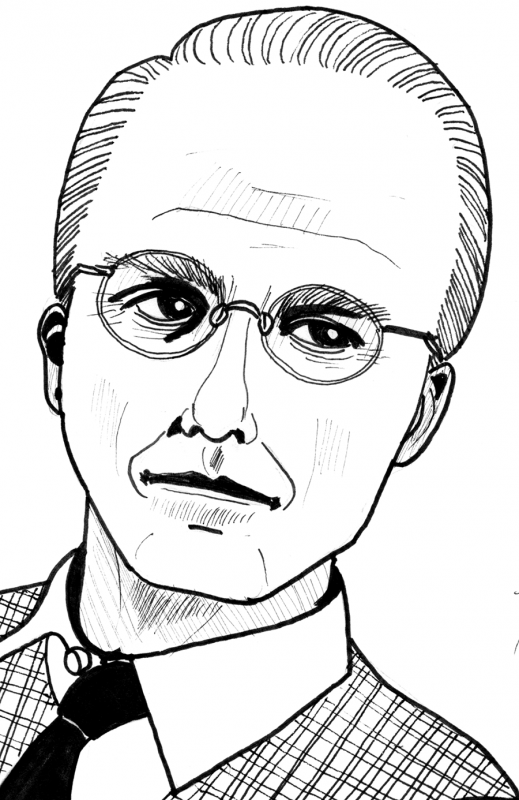
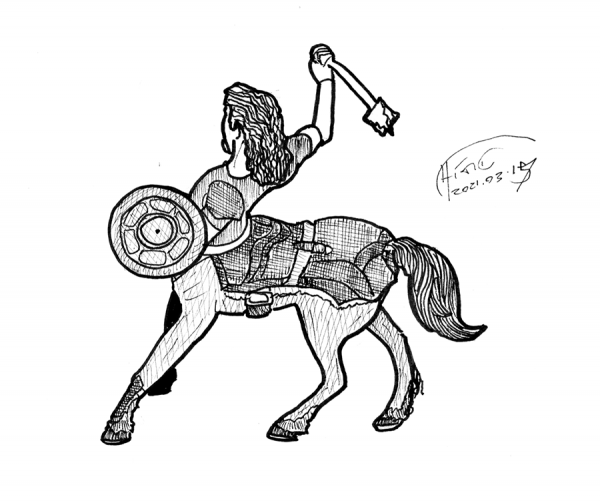 Drawn from a small centaur statue I have in the genre toys / reference objects collection on my drawing desk. Didn't come out too bad, and the perspective and angle were an interesting challenge.
Drawn from a small centaur statue I have in the genre toys / reference objects collection on my drawing desk. Didn't come out too bad, and the perspective and angle were an interesting challenge.
 Drawing every day.
-the Centaur
Drawing every day.
-the Centaur 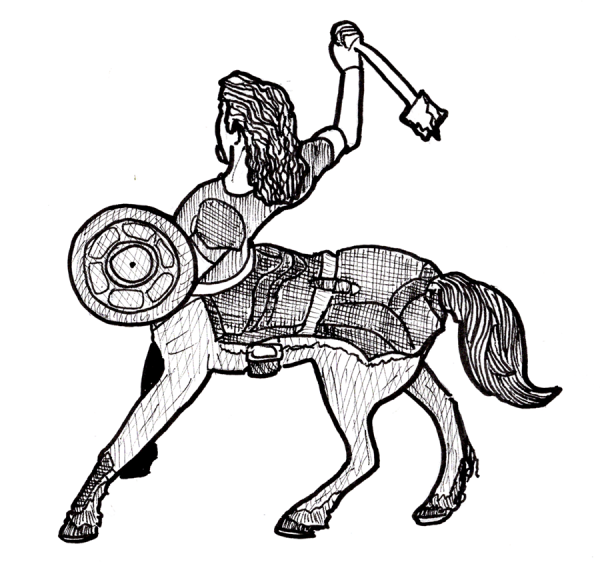
 Suuuper quick sketch of Gene Robinson, done by tracing over my own ink roughs.
Suuuper quick sketch of Gene Robinson, done by tracing over my own ink roughs.
 As for the analysis, eyes off a bit, yeah, whatever, it's time for bed.
Drawing every day.
-the Centaur
As for the analysis, eyes off a bit, yeah, whatever, it's time for bed.
Drawing every day.
-the Centaur  As it says on the tin: it's late and I'm tired, so here's a quick sketch with a big honking Sharpie on 9x12 Strathmore, no roughs whatsoever. Roughs would have helped correct a few errors of outline and proportion - I didn't quite get the roundness of gabby there on the left - but real roughs would have taken longer than 10-15 minutes, and I'd have been up to 3AM again when trying to get to bed early.
As it says on the tin: it's late and I'm tired, so here's a quick sketch with a big honking Sharpie on 9x12 Strathmore, no roughs whatsoever. Roughs would have helped correct a few errors of outline and proportion - I didn't quite get the roundness of gabby there on the left - but real roughs would have taken longer than 10-15 minutes, and I'd have been up to 3AM again when trying to get to bed early.
 Drawing every day.
-the Centaur
Drawing every day.
-the Centaur  Yeah, so that happened on my attempt to get some rest on my Sabbath day.
I'm not going to cite the book - I'm going to do the author the courtesy of re-reading the relevant passages to make sure I'm not misconstruing them, but I'm not going to wait to blog my reaction - but what caused me to throw this book, an analysis of the flaws of the scientific method, was this bit:
Imagine an experiment with two possible outcomes: the new theory (cough EINSTEIN) and the old one (cough NEWTON). Three instruments are set up. Two report numbers consistent with the new theory; the third one, missing parts, possibly configured improperly and producing noisy data, matches the old.
Wow! News flash: any responsible working scientist would say these results favored the new theory. In fact, if they were really experienced, they might have even thrown out the third instrument entirely - I've learned, based on red herrings from bad readings, that it's better not to look too closely at bad data.
What did the author say, however? Words to the effect: "The scientists ignored the results from the third instrument which disproved their theory and supported the original, and instead, pushing their agenda, wrote a paper claiming that the results of the experiment supported their idea."
Pushing an agenda? Wait, let me get this straight, Chester Chucklewhaite: we should throw out two results from well-functioning instruments that support theory A in favor of one result from an obviously messed-up instrument that support theory B - oh, hell, you're a relativity doubter, aren't you?
Chuck-toss.
I'll go back to this later, after I've read a few more sections of E. T. Jaynes's Probability Theory: The Logic of Science as an antidote.
-the Centaur
P. S. I am not saying relativity is right or wrong, friend. I'm saying the responsible interpretation of those experimental results as described would be precisely the interpretation those scientists put forward - though, in all fairness to the author of this book, the scientist involved appears to have been a super jerk.
Yeah, so that happened on my attempt to get some rest on my Sabbath day.
I'm not going to cite the book - I'm going to do the author the courtesy of re-reading the relevant passages to make sure I'm not misconstruing them, but I'm not going to wait to blog my reaction - but what caused me to throw this book, an analysis of the flaws of the scientific method, was this bit:
Imagine an experiment with two possible outcomes: the new theory (cough EINSTEIN) and the old one (cough NEWTON). Three instruments are set up. Two report numbers consistent with the new theory; the third one, missing parts, possibly configured improperly and producing noisy data, matches the old.
Wow! News flash: any responsible working scientist would say these results favored the new theory. In fact, if they were really experienced, they might have even thrown out the third instrument entirely - I've learned, based on red herrings from bad readings, that it's better not to look too closely at bad data.
What did the author say, however? Words to the effect: "The scientists ignored the results from the third instrument which disproved their theory and supported the original, and instead, pushing their agenda, wrote a paper claiming that the results of the experiment supported their idea."
Pushing an agenda? Wait, let me get this straight, Chester Chucklewhaite: we should throw out two results from well-functioning instruments that support theory A in favor of one result from an obviously messed-up instrument that support theory B - oh, hell, you're a relativity doubter, aren't you?
Chuck-toss.
I'll go back to this later, after I've read a few more sections of E. T. Jaynes's Probability Theory: The Logic of Science as an antidote.
-the Centaur
P. S. I am not saying relativity is right or wrong, friend. I'm saying the responsible interpretation of those experimental results as described would be precisely the interpretation those scientists put forward - though, in all fairness to the author of this book, the scientist involved appears to have been a super jerk.
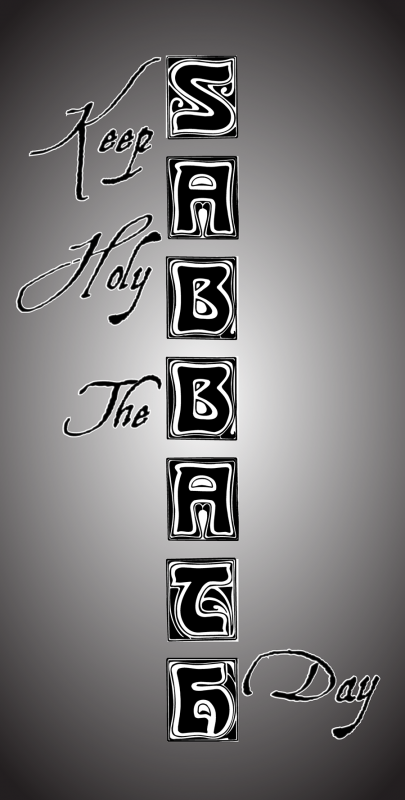
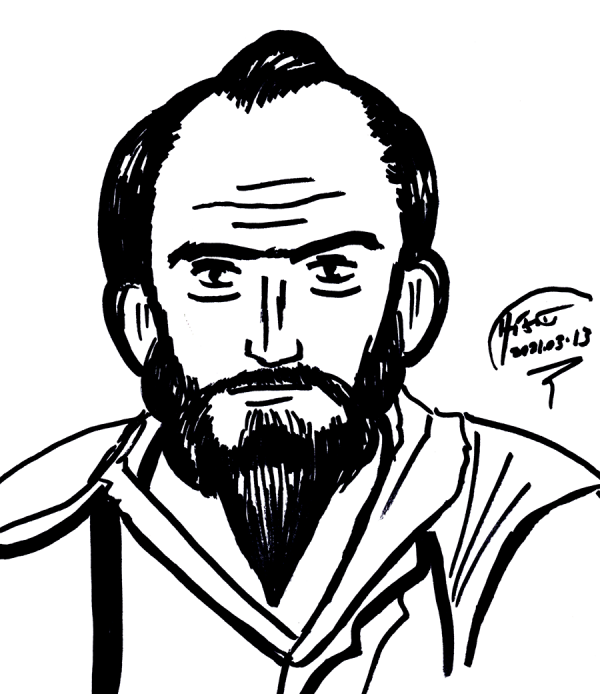 Sharpie sketch of the Apostle Paul, interpolated from the
Sharpie sketch of the Apostle Paul, interpolated from the 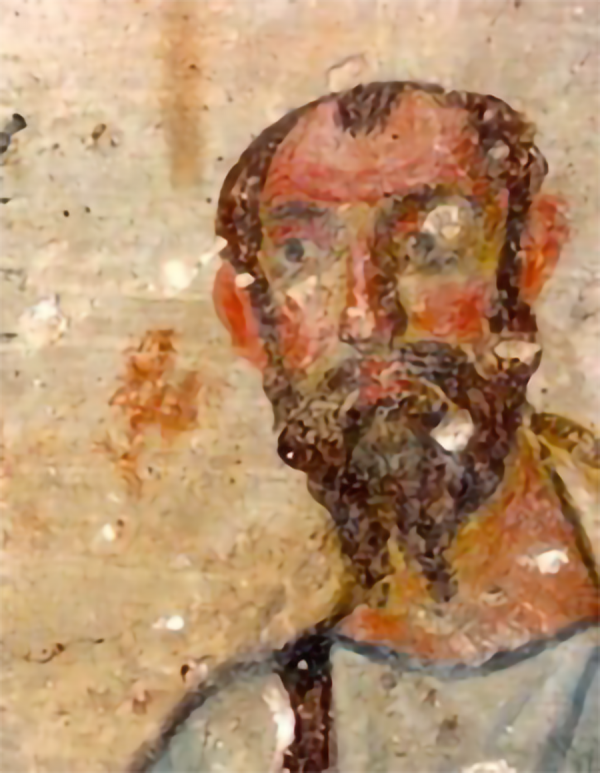

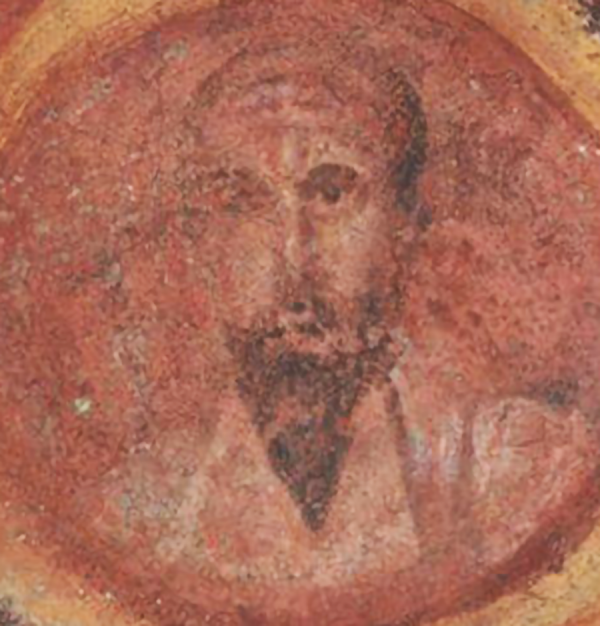 Drawing every day.
-the Centaur
Drawing every day.
-the Centaur  The Old Testament is filled with rules and regulations - reams of them scattered through Exodus, Leviticus, and Numbers, and then fleshed out further in Deuteronomy. And Jesus said that He didn't come to abolish the law and the prophets, but to fulfill them.
But not so fast. Even though Jesus said in the Sermon on the Mount that nothing would be struck from the the law until "all was accomplished," elsewhere, He said the law and the prophets were proclaimed - past tense - until John, and since then the Gospel has been proclaimed, and everyone's trying to get in.
What's this mean? And how do we fit this in with the fact that Jesus reinterpreted the law all the time? The key comes from this comment by the Apostle Paul: "All things are lawful unto me, but all things are not expedient: all things are lawful for me, but I will not be brought under the power of any."
This phrase is part of a longer explanation by Paul of principles that Jesus demonstrates by example. Both Paul's arguments in Corinthians, and Jesus's frequent rebuttals of the Pharisees, both reject strict applications of the law in favor of appeals to focus on what's good for everyone involved.
I've argued before that Jesus's approach to the law is surprisingly modern and scientific, focusing not on whether someone is strictly obedient to the letter of the law but instead on what various acts do to people. Food passes through the body, and so doesn't make us unclean; but bad thoughts do.
Paul's approach is similar, suggesting that believers resolve disputes not with lawsuits but by arbitration by fellow Christians, and that people who are hurting themselves or others with greed, theft, idolatry, lust, or betrayal are committing sins against their own bodies, which should be sanctified for God.
While both Paul and Jesus condemn various behaviors, we shouldn't take those as an exhaustive list. That's the whole point of the passages: just because something isn't listed on that list doesn't make it right, and conversely, treating Paul or Jesus's examples as Pharisaical commands misses the point.
In Catholic theology, this kind of thinking is called having a "scrupulous conscience" - taking the law as a very literal set of rules which we should follow to the letter, like a roleplayer in a D&D game trying to argue with the gamemaster about whether a given spell would or would not slay a crystal dragon.
But what's printed in the rules of D&D - no matter how specific, regardless of edition - takes second place to what the gamemaster wants to run in his campaign. Similarly, Jesus and Paul want us to develop our own moral imagination, so we can decide, as Jesus did, that it's okay to rescue an ox on the Sabbath.
To unpack this, the laws of the Old Testament are ceremonial, civil and moral. Ceremonial law had to do with Israel's worship, which Christians think pointed ahead to Jesus's coming, became obsolete with his Resurrection, and were arguably - though disputedly - set aside in the Incident at Antioch.
The civil laws of the Old Testament, like the declaration of a jubilee year or the rules for managing slaves, had to do with a society which is very different from the one we have today, and even though they're described as being eternal laws, few Christians think we should apply them all strictly.
Moral laws, like the Ten Commandments and the Great Commandment (which is normally associated with Jesus, but is also present in the Old Testament) retain their force. Not coveting, lying, cheating, stealing, or murdering remain as problematic for us today as they were back in the day.
Jesus's ministry, especially the Sermons of the Mount and the Plain, both adds to and takes away from our understanding of these Old Testament laws. He reinforces some old laws, reinterprets laws like divorce, and provides new examples that set a higher standard.
And yet, He still says the law wasn't going to pass away until everything is fulfilled - a fulfillment which many people take to mean His Resurrection. But I think there's more to it than that. Jesus was God, and taught with authority, so for him to emphasize the law, even as he went beyond it, meant something.
Paul again provides us the key. Perhaps it is true that all things are lawful now, but not everything's good for us. And on the principle that things are not good because the law says so, but that the law says so because things are good for us - we should study the law and use it to guide our understanding.
Yes, we no longer celebrate a jubilee year. Yes, the Jewish dietary restrictions are no longer relevant. Yes, the Biblical attitude to homosexuality is grounded in the prejudices of the cultures at the time, and shows neither a correct understanding of human sexuality nor a Christian respect for individual persons.
But it's worth understanding why these were laws in the first place. It's worthwhile to consider canceling debts. It's worthwhile to consider whether our diets are healthy. It's worthwhile to consider our expression of our sexuality and ask whether it is building up our tearing down our lives and the lives of our partners.
All things may be lawful in the Christian faith if the most important point of Christianity is believing in Jesus and choosing to follow Him - but that can be a difficult path, so it's worth reviewing our lives and asking whether we're making it easy to follow Him, or throwing stumbling blocks down for ourselves.
-the Centaur
Pictured: the Apostle Paul, interpolated from three early paintings and the only physical description of him that I know of: of middling size, with scanty hair, large eyes, a long nose, and eyebrows that met.
The Old Testament is filled with rules and regulations - reams of them scattered through Exodus, Leviticus, and Numbers, and then fleshed out further in Deuteronomy. And Jesus said that He didn't come to abolish the law and the prophets, but to fulfill them.
But not so fast. Even though Jesus said in the Sermon on the Mount that nothing would be struck from the the law until "all was accomplished," elsewhere, He said the law and the prophets were proclaimed - past tense - until John, and since then the Gospel has been proclaimed, and everyone's trying to get in.
What's this mean? And how do we fit this in with the fact that Jesus reinterpreted the law all the time? The key comes from this comment by the Apostle Paul: "All things are lawful unto me, but all things are not expedient: all things are lawful for me, but I will not be brought under the power of any."
This phrase is part of a longer explanation by Paul of principles that Jesus demonstrates by example. Both Paul's arguments in Corinthians, and Jesus's frequent rebuttals of the Pharisees, both reject strict applications of the law in favor of appeals to focus on what's good for everyone involved.
I've argued before that Jesus's approach to the law is surprisingly modern and scientific, focusing not on whether someone is strictly obedient to the letter of the law but instead on what various acts do to people. Food passes through the body, and so doesn't make us unclean; but bad thoughts do.
Paul's approach is similar, suggesting that believers resolve disputes not with lawsuits but by arbitration by fellow Christians, and that people who are hurting themselves or others with greed, theft, idolatry, lust, or betrayal are committing sins against their own bodies, which should be sanctified for God.
While both Paul and Jesus condemn various behaviors, we shouldn't take those as an exhaustive list. That's the whole point of the passages: just because something isn't listed on that list doesn't make it right, and conversely, treating Paul or Jesus's examples as Pharisaical commands misses the point.
In Catholic theology, this kind of thinking is called having a "scrupulous conscience" - taking the law as a very literal set of rules which we should follow to the letter, like a roleplayer in a D&D game trying to argue with the gamemaster about whether a given spell would or would not slay a crystal dragon.
But what's printed in the rules of D&D - no matter how specific, regardless of edition - takes second place to what the gamemaster wants to run in his campaign. Similarly, Jesus and Paul want us to develop our own moral imagination, so we can decide, as Jesus did, that it's okay to rescue an ox on the Sabbath.
To unpack this, the laws of the Old Testament are ceremonial, civil and moral. Ceremonial law had to do with Israel's worship, which Christians think pointed ahead to Jesus's coming, became obsolete with his Resurrection, and were arguably - though disputedly - set aside in the Incident at Antioch.
The civil laws of the Old Testament, like the declaration of a jubilee year or the rules for managing slaves, had to do with a society which is very different from the one we have today, and even though they're described as being eternal laws, few Christians think we should apply them all strictly.
Moral laws, like the Ten Commandments and the Great Commandment (which is normally associated with Jesus, but is also present in the Old Testament) retain their force. Not coveting, lying, cheating, stealing, or murdering remain as problematic for us today as they were back in the day.
Jesus's ministry, especially the Sermons of the Mount and the Plain, both adds to and takes away from our understanding of these Old Testament laws. He reinforces some old laws, reinterprets laws like divorce, and provides new examples that set a higher standard.
And yet, He still says the law wasn't going to pass away until everything is fulfilled - a fulfillment which many people take to mean His Resurrection. But I think there's more to it than that. Jesus was God, and taught with authority, so for him to emphasize the law, even as he went beyond it, meant something.
Paul again provides us the key. Perhaps it is true that all things are lawful now, but not everything's good for us. And on the principle that things are not good because the law says so, but that the law says so because things are good for us - we should study the law and use it to guide our understanding.
Yes, we no longer celebrate a jubilee year. Yes, the Jewish dietary restrictions are no longer relevant. Yes, the Biblical attitude to homosexuality is grounded in the prejudices of the cultures at the time, and shows neither a correct understanding of human sexuality nor a Christian respect for individual persons.
But it's worth understanding why these were laws in the first place. It's worthwhile to consider canceling debts. It's worthwhile to consider whether our diets are healthy. It's worthwhile to consider our expression of our sexuality and ask whether it is building up our tearing down our lives and the lives of our partners.
All things may be lawful in the Christian faith if the most important point of Christianity is believing in Jesus and choosing to follow Him - but that can be a difficult path, so it's worth reviewing our lives and asking whether we're making it easy to follow Him, or throwing stumbling blocks down for ourselves.
-the Centaur
Pictured: the Apostle Paul, interpolated from three early paintings and the only physical description of him that I know of: of middling size, with scanty hair, large eyes, a long nose, and eyebrows that met. 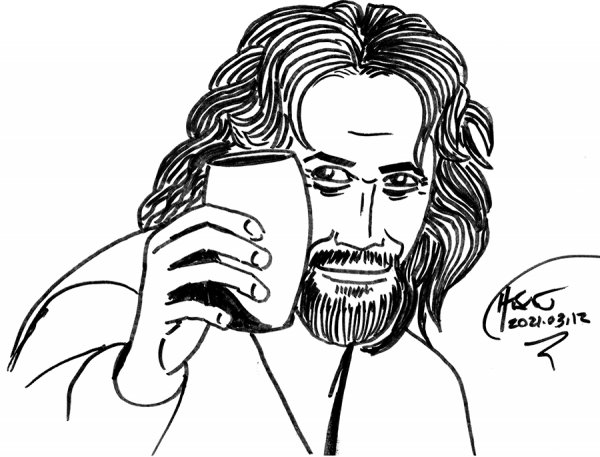 Suuuuper quick sketch of Willem Dafoe in The Last Temptation of Christ, done with a big honking Sharpie. My first failed drawing on Strathmore 9x12 served as a basis for a quick resketch on 9x12 tracing paper, again with the Sharpie - it has such a crystallizing effect on your drawing, as those huge darn lines cannot be taken back and you just gotta GO with it. Not altogether bad for 10 minutes, though that darn "head de-tiltification" thing is still working against me:
Suuuuper quick sketch of Willem Dafoe in The Last Temptation of Christ, done with a big honking Sharpie. My first failed drawing on Strathmore 9x12 served as a basis for a quick resketch on 9x12 tracing paper, again with the Sharpie - it has such a crystallizing effect on your drawing, as those huge darn lines cannot be taken back and you just gotta GO with it. Not altogether bad for 10 minutes, though that darn "head de-tiltification" thing is still working against me:
 Drawing every day.
-the Centaur
Drawing every day.
-the Centaur 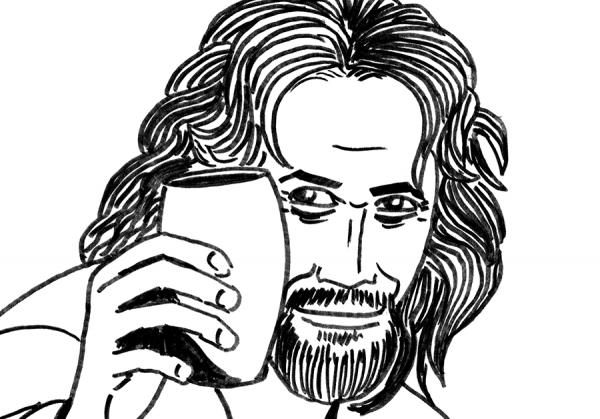
 Quick sketch of Reginald Fuller, using pencil roughs (started upside down to get the proportions, then rotated back to normal to fix the details, which was harder than expected; the first upside down one turned out to be more useful for me to see the features and relationships, but I only got it right once I put it right side up). Then a quick render with Sakura Pigma and Micron pens and a Sharpie.
Not ... altogether bad, though it could have used another pass.
Quick sketch of Reginald Fuller, using pencil roughs (started upside down to get the proportions, then rotated back to normal to fix the details, which was harder than expected; the first upside down one turned out to be more useful for me to see the features and relationships, but I only got it right once I put it right side up). Then a quick render with Sakura Pigma and Micron pens and a Sharpie.
Not ... altogether bad, though it could have used another pass.
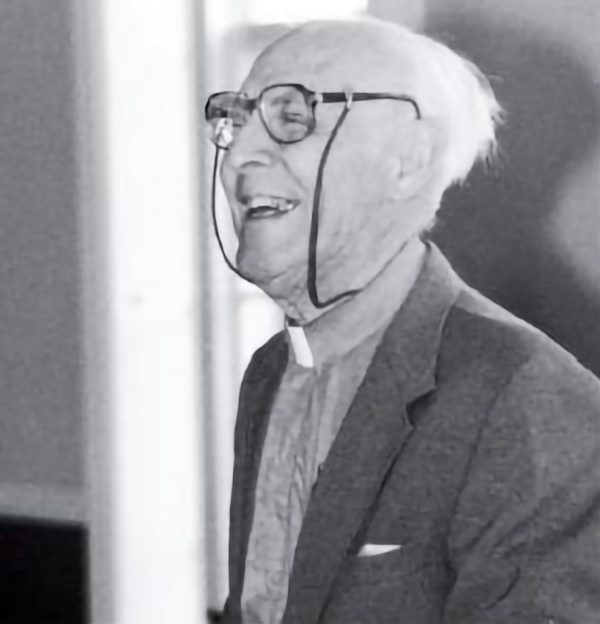 He, also, looks so happy.
Drawing every day.
-the Centaur
He, also, looks so happy.
Drawing every day.
-the Centaur 
 Super quick sketch of Robert Axelrod, done by tracing over my own roughs twice then rendering over that with my standard Sakura Microns. Eyes WAY too big, face too wide, I didn't quite get the head tilt (as usual), and it seems like I cut off part of the top of his head, though I was partially able to fix it.
Super quick sketch of Robert Axelrod, done by tracing over my own roughs twice then rendering over that with my standard Sakura Microns. Eyes WAY too big, face too wide, I didn't quite get the head tilt (as usual), and it seems like I cut off part of the top of his head, though I was partially able to fix it.
 Drawing every day.
-the Centaur
Drawing every day.
-the Centaur 